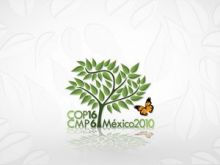How to stop climate change, deal with global warming, and manage the inevitable consequences — these and other important questions were discussed by delegations from 192 countries participating in the UN Framework Convention on Climate Change at the 16th United Nations Climate Change Conference. The international negotiations lasted for two weeks in Mexico. One of the conference’s tasks was to elaborate a new international agreement, which will regulate the environmental policy of almost 200 countries after the Kyoto Protocol expires. As it is known, the protocol’s term of effect ends in two years. According to the protocol, developed countries are obliged to reduce carbon dioxide emissions in the atmosphere by five percent.
This problem was the most contested issue at the conference. According to the experts of the National Ecology Center of Ukraine, who participated in the climate negotiations, the discussion flared up among a group of developing countries headed by China and developed countries (including the US, Japan, New Zealand, and EU members). In the opinion of such countries as Japan, Russia or Canada, the developing countries must also commit to reducing carbon dioxide emissions. However, as the practice of previous negotiations shows, not all countries are willing to do it. Ukraine tried to argue that it is still a transitional economy. After the completion of the negotiations in Mexico, together with other states we undertook obligations to revise those norms, and also to introduce projects which would reduce emissions in the atmosphere and would presuppose the introduction of low-carbonic technologies. Thus, Ukraine now must opt for a different environmental policy.
“The fact that the countries found a compromise and reached an agreement in solving such important tasks is a positive result. However, at the same time, the issue of establishing obligations on reducing greenhouse gas emissions by each separate country and transferring unused quotas for the future remains unsolved,” comments Iryna Stavchuk, an expert of the National Ecology Center of Ukraine. “By the way, that is why Ukraine, together with Russia, New Zealand, and Australia, received the anti-prize ‘Dinosaur of The Day.’ The international community rendered this verdict because these countries blocked negotiations regarding the sale of unused quotas for greenhouse gas emission. As the International Climate Network explained, the immense excess of quotas, which Ukraine and Russia possess, appeared not owing to efficient actions on reducing greenhouse gas emissions. If the excess of quotas is transferred for the future, industrially developed countries will not need to make efforts to reduce emissions and will continue greenhouse gas emissions.”
Experts consider the agreement of all countries on not allowing for global temperature increases of two degrees and attempts to keep the global warming at a level of 1.5 degrees a considerable success.
Indeed, if the temperature on Earth continues to increase, this will lead to considerable damages to the natural system. To prevent this, the delegations made a decision on creating the Green Climate Fund, which will allot 100 billion dollars per year to the developing countries for the measures to struggle against climate change. Experts point out that Ukraine can also claim financing for so-called green projects.
In general, representatives of Ukrainian public organizations persuade that the negotiations in Mexico added optimism and showed that the world really wants to stop climate change. However, it should be done in a little more active and efficient manner, particularly in Ukraine. According to the coordinator of the program on climate change of the National Ecology Center of Ukraine Khrystyna Rudnytska, our state must not only defend its financial interests but also assist in concluding a new climate agreement.
In the meanwhile, Ukrainians are ready to struggle against climate change without directions from above and special state programs. While the negotiations in Cancun were still ongoing, in Kyiv ecological organizations held the action “Change Yourself, Not the Climate.” Participants wrote slogans on banners, saying that they are ready to ride bicycles, if bicycle lanes are provided, plant trees if they are not cut down, drive electric cars and sort waste, and also refuse from using plastic bags. The organizers of the action passed on these proposals to the National Agency of Ecology Investments — the main state structure in Ukraine for solving issues related to global climate change. However, there is still no answer. The next stage of the international negotiations regarding climate change is scheduled for next year. There Ukraine will not be able to keep silent, since specific results will be expected of it.







